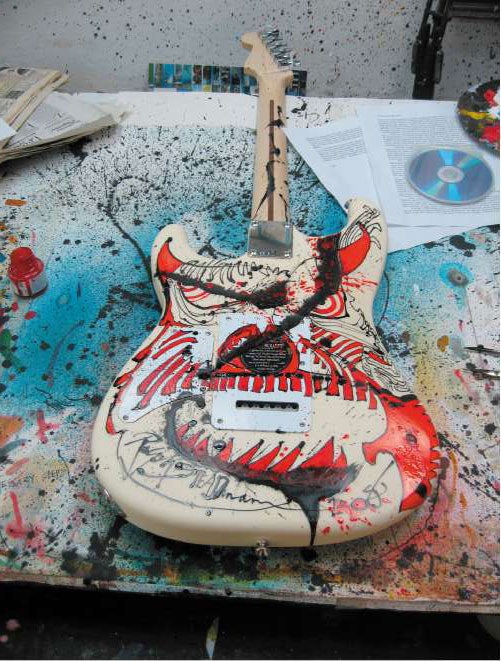
Your support helps us to tell the story
From reproductive rights to climate change to Big Tech, The Independent is on the ground when the story is developing. Whether it's investigating the financials of Elon Musk's pro-Trump PAC or producing our latest documentary, 'The A Word', which shines a light on the American women fighting for reproductive rights, we know how important it is to parse out the facts from the messaging.
At such a critical moment in US history, we need reporters on the ground. Your donation allows us to keep sending journalists to speak to both sides of the story.
The Independent is trusted by Americans across the entire political spectrum. And unlike many other quality news outlets, we choose not to lock Americans out of our reporting and analysis with paywalls. We believe quality journalism should be available to everyone, paid for by those who can afford it.
Your support makes all the difference.I'm seriously considering making a late bid for rock stardom and reforming my student band, The Abusers. We split sometime in 1981 – or possibly '82 – over differences concerning nomenclature. I favoured changing the band's name to Will Self and the Abusers, but understandably the others were against it. Pete Miller, the bassist, and a black kid called Chris, who played the drums and came from the Rosehill estate outside Oxford, split to form their own, more reggaecentric outfit dubbed Dub Vendor (like the celebrated platter shack in Notting Hill). Apart from me, they were the best musicians, and without them the Abusers were the empty chassis of a car with its rhythmic engine torn out.
Not that we'd ever been the tightest band around. Tight, mmm... as I recall this was always the purest approbation: standing in the sweaty, beery, fag-saturated crowds at the Marquee, the Electric Ballroom and the Roundhouse, watching bands with names like the Pink Fairies, and Alien Sex Fiend, nodding sagely, then turning to your companion and uttering the shibboleth: "They're really tight, man." The Abusers, by contrast, were really loose – baggy, even.
Sometimes as many as 12 of us would mount the stage and crash into our legendary 25-minute cover of The Crystals' "Da Do Ron Ron". The line-up included: a 6ft 6in Rastafarian poet called Rocky, who spouted performance poetry; a lesbian-separatist guitarist with an extra-long lead on her double-headed axe so that she didn't have to associate with the rest of us; and, in the early stages at least, Geoff Mulgan who went on to head Demos, and then the Policy Unit at Number 10.
It was said of Robert Johnson the legendary "King of the Delta Blues singers", that he sold his soul to the Devil in exchange for the ability to play anything he wanted on the guitar. This took place at midnight, sometime in the 1920s, at a crossroads near Dockery's plantation in the rural fastness of Mississippi. Johnson is credited with being the father of rock'n'roll, and indeed his hard-driving, percussive style of guitar-playing, and his ability to belt out misery with such cogency, had an immeasurable influence on generations of middle-class English white boys.
In the States, where the blues and country music are twined together into the DNA of an authentic tradition – a true folk music – movement has always been key. The experience of black sharecroppers, pushed off the land during the Depression, and forced into the northern urban ghettos, contains within it all the propulsion that has kept American rock'n'roll continuously evolving. The US is also a huge country, one in which the mythopoeic road, married to the insistent rhythm of the four-stroke internal combustion engine, has generated an thousand thousand songs.
Of course, in this tea-towel-sized island, the idea of a "road song" is just as much of a solecism as a "road movie". English rock music has, instead, always had a distinctly performative feel to it – music hall rather than Motown. The quintessential songs of place are concerned with creating proscenium arches, then populating the stage with characters. From "Waterloo Sunset" to "White Man in Hammersmith Palais" to "Parklife", these are static-romantic contrivances. Not that they should be condemned for it, there is the continuation of a tradition here, but it ain't rock n' roll so far as I'm concerned.
But then I would say that, wouldn't I? There wasn't much comparison between Oxfordshire in the early 1980s and Mississippi in the 1920s, but the Mephistophelean remained surprisingly constant. Despite being entirely self-taught, I was by the age of 19 undoubtedly the finest rock'n'roll guitarist in England. My lightning riffs, ceaseless invention, and note-perfect picking were the envy of such giants as Eric "Slow Hand" Clapton, and Keith Richards. The latter often used to run little errands for me – such as popping up to the corner shop to get a pint of milk – so in awe of my playing was he.
Then, one night, coming back from a gig, I met the Devil at the crossroads of Carfax and the High Street. He appeared to me in the guise of a Human Resources manager for ICI, and offered me a decent career in industry with job security. Instead of dieing an early death, I would live long enough to raise a family, receive a decent pension, and become a Tory councillor. In sum: I would receive the very soul of Englishness in exchange for my ability to play the guitar.
How could I refuse? With Pete and Chris already gone from the Abusers the band was limping along, and besides, I already intuitively grasped the limits of Anglo rock, and foresaw the arid classicism that would lead to Coldplay. I signed the contract in blood and never regretted it. Until now, after all, rock'n'roll will never die – and besides, my pension is woefully underperforming.
Join our commenting forum
Join thought-provoking conversations, follow other Independent readers and see their replies
Comments